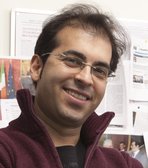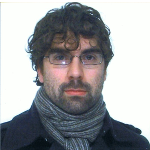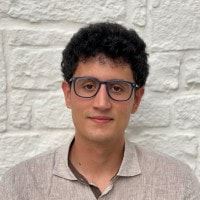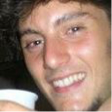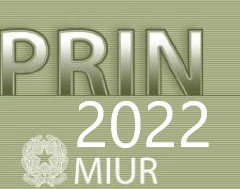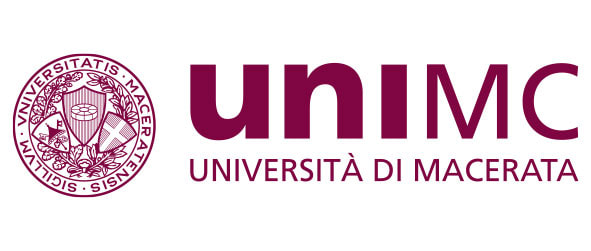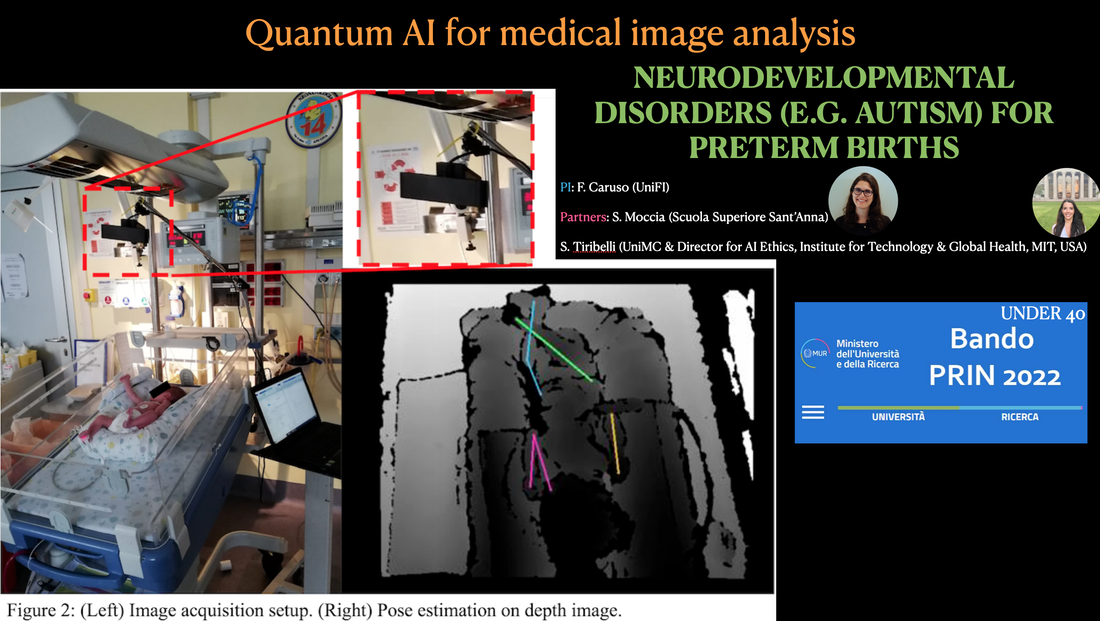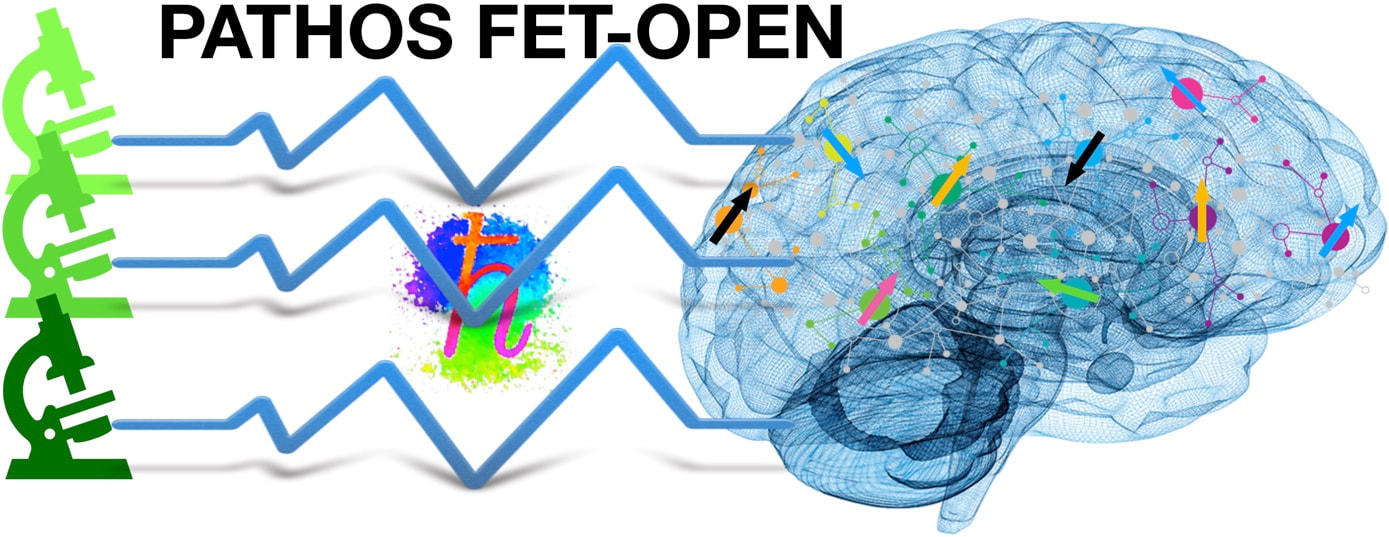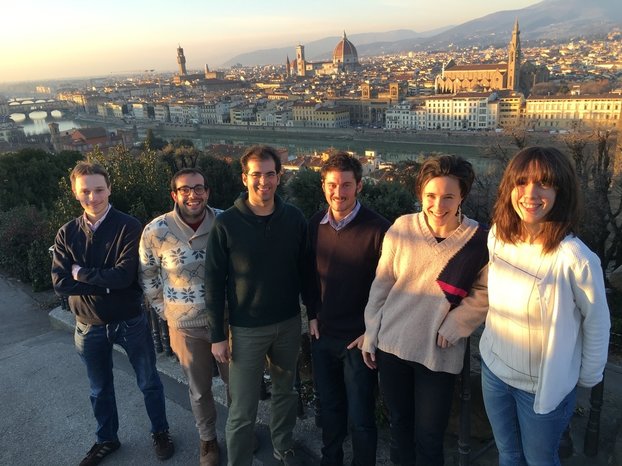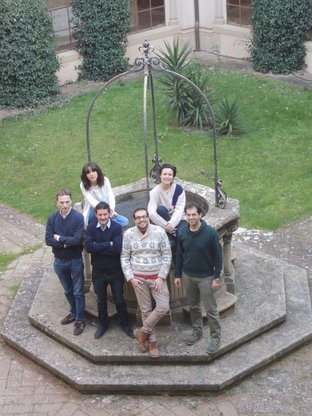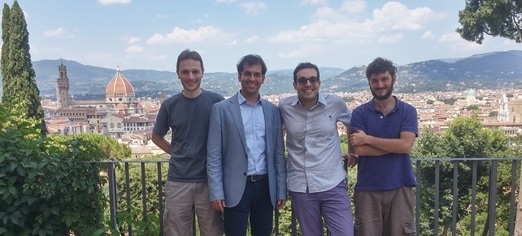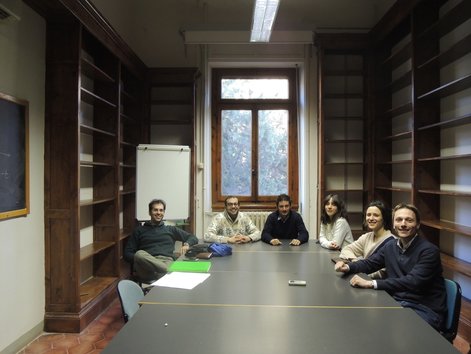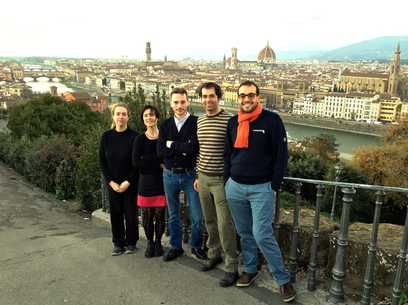Group Leader
Assistant Professor (RTDa)
Postdoctoral members
PhD Fellows
Former PhD/postdoc members
Supervised bachelor students:
Gabriele Chilleri, Alessio Fallani, Francesco Grieco, Giacomo Spadini, Davide Chimenti, Ludovica Donati
Supervised master students:
Emanuele Casciaro, Marco Parigi, Andrea Fantini, Emanuele Frosini, Ettore Canonici, Maurizio Verde, Stefano Gherardini
Hiring two one-year postdocs (PhD required) with expertise in quantum machine learning, starting at any time from February 2024
Towards a World-Class Supercomputing Ecosystem - HPCQS Pioneers Federated Quantum-Super-Computing in Europe
www.hpcqs.eu
February 1, 2024 or later
With the new project “High-Performance Computer and Quantum Simulator hybrid” (HPCQS) Europe enters into the new era of hybrid quantum-high-performance computing. HPCQS sets out to integrate two quantum simulators, each controlling about 100+ qubits in supercomputers located at two European HPC centers. The European High-Performance Computing Joint Undertaking (EuroHPC JU) based in Luxembourg has granted the infrastructure project in the framework of its Research and Innovation Action “Advanced pilots towards the European exascale Supercomputers”. HPCQS will receive a total budget of 12 Mio Euro over the next four years, which is provided by the EuroHPC JU and the participating member states in equal parts.
Joining the efforts of academia, including research and technology organizations and industry, Europe will foster its future competitiveness by addressing applications related to complex simulations and optimization problems. The latter can be found, for example, in materials and drug design, logistics and transportation as well as many other relevant use cases. HPCQS will play a key role by enabling research entities and industries to exploit the new quantum technologies and find solutions to complex problems.
The four-year pilot project HPCQS will develop the programming platform for the quantum simulator. It is based on two European software developments, the Atos Quantum Learning Machine (QLM)TM and ParTec’s Parastation ModuloTM. Together, these technologies allow the deep, low-latency integration of quantum simulators into classical modular HPC systems as a first-of-its-kind realization.
To achieve these goals, HPCQS brings together leading quantum and supercomputer experts from science and industry from six European countries. HPCQS will become an incubator for practical quantum HPC hybrid computing that is unique in the world. The five participating European HPC centers JSC at Forschungszentrum Jülich (Tier-0 site, Germany), GENCI/CEA (Tier-0 site, France), Barcelona Supercomputing Center (Tier-0 and pre-exascale site, Spain), CINECA (Tier-0 and pre-exascale site, Italy) and NUIG-ICHEC (Tier-1 site, Ireland) collaborate closely with the technological partners Atos (France), ParTec (Germany), FlySight (Italy), ParityQC (Austria), the research partners CEA (France), CNRS (France), Inria (France), CNR (Italy), the University of Innsbruck (Austria), Fraunhofer IAF (Germany) and the SME partner Eurice (Germany) to reach their joint goals. In addition, the HPCQS project has received more than thirty letters of support from academia, industry, SMEs and start-ups, which demonstrates the strong expectations of the European user community.
CNR Team Leader: Prof. Filippo Caruso
Position summary
Full-time temporary employment for two years.
Qualifications
Required qualifications:
- PhD in Physics or equivalent.
- Fluency in English, oral and written; interest and skills in working collaboratively as well as independently.
Experience in one or more of these fields is desired:
- Machine Learning and optimisation algorithms.
- Quantum Information Theory.
- Quantum Machine Learning.
- Python programming.
More information about the position and how to apply: please urgently write to [email protected]
With the new project “High-Performance Computer and Quantum Simulator hybrid” (HPCQS) Europe enters into the new era of hybrid quantum-high-performance computing. HPCQS sets out to integrate two quantum simulators, each controlling about 100+ qubits in supercomputers located at two European HPC centers. The European High-Performance Computing Joint Undertaking (EuroHPC JU) based in Luxembourg has granted the infrastructure project in the framework of its Research and Innovation Action “Advanced pilots towards the European exascale Supercomputers”. HPCQS will receive a total budget of 12 Mio Euro over the next four years, which is provided by the EuroHPC JU and the participating member states in equal parts.
Joining the efforts of academia, including research and technology organizations and industry, Europe will foster its future competitiveness by addressing applications related to complex simulations and optimization problems. The latter can be found, for example, in materials and drug design, logistics and transportation as well as many other relevant use cases. HPCQS will play a key role by enabling research entities and industries to exploit the new quantum technologies and find solutions to complex problems.
The four-year pilot project HPCQS will develop the programming platform for the quantum simulator. It is based on two European software developments, the Atos Quantum Learning Machine (QLM)TM and ParTec’s Parastation ModuloTM. Together, these technologies allow the deep, low-latency integration of quantum simulators into classical modular HPC systems as a first-of-its-kind realization.
To achieve these goals, HPCQS brings together leading quantum and supercomputer experts from science and industry from six European countries. HPCQS will become an incubator for practical quantum HPC hybrid computing that is unique in the world. The five participating European HPC centers JSC at Forschungszentrum Jülich (Tier-0 site, Germany), GENCI/CEA (Tier-0 site, France), Barcelona Supercomputing Center (Tier-0 and pre-exascale site, Spain), CINECA (Tier-0 and pre-exascale site, Italy) and NUIG-ICHEC (Tier-1 site, Ireland) collaborate closely with the technological partners Atos (France), ParTec (Germany), FlySight (Italy), ParityQC (Austria), the research partners CEA (France), CNRS (France), Inria (France), CNR (Italy), the University of Innsbruck (Austria), Fraunhofer IAF (Germany) and the SME partner Eurice (Germany) to reach their joint goals. In addition, the HPCQS project has received more than thirty letters of support from academia, industry, SMEs and start-ups, which demonstrates the strong expectations of the European user community.
CNR Team Leader: Prof. Filippo Caruso
Position summary
Full-time temporary employment for two years.
Qualifications
Required qualifications:
- PhD in Physics or equivalent.
- Fluency in English, oral and written; interest and skills in working collaboratively as well as independently.
Experience in one or more of these fields is desired:
- Machine Learning and optimisation algorithms.
- Quantum Information Theory.
- Quantum Machine Learning.
- Python programming.
More information about the position and how to apply: please urgently write to [email protected]
Photonic and nAnomeTric High-sensitivity biO-Sensing
www.pathos-fetopen.eu
Within the EU FET-OPEN H2020, the PATHOS consortium is developing a radically new technology for the sensing of bio-systems and in-vivo diagnostics of biomedical conditions using hitherto unexploited tools (pioneered by the partners of this very interdisciplinary consortium): unconventional complex-system dynamical control and information sampling/processing, e.g. (i) magnetic-resonance imaging (MRI) and optically-detected magnetic-resonance (ODMR) sensing via cooling/suppression of thermal noisy background in-vivo, (ii) NMR intra-molecule/intra-tissue sensing and intra-cell NV-center thermometry, (iii) advanced sensing-data processing, including high-order correlation spectroscopy.
As part of this effort, at the University of Florence we are continuously seeking Postdocs in Quantum Information Theory and Noise Sensing, who will work on the controlled and optimised manipulation of quantum probes and the analysis of spatial and temporal correlations of environmental noise.
Photonic and nAnomeTric High-sensitivity biO-Sensing (PATHOS)
PI: F. Caruso (Florence Univ., Coordinator), G. Kurizki (Weizmann), M. Genovese (INRIM), N. Bar-Gill (HUJI), D. Suter (TUDO)
Co-PI: L. Frydman (Weizmann), D. Wiersma (Florence Univ.), J. Howell (HUJI)
Theoretical physicists trained in quantum information science that are interested in learning noise-sensing with possible bio-applications are welcome to apply. And vice versa theoretical quantum chemists/physicists trained in bio-sensing that are interested in learning quantum information processing are also welcome to apply.
Position summary
Full-time temporary employment. The position is limited to 1 year, extendable for other 3 years, starting at any time since February 2024.
Qualifications
Required qualifications:
- PhD in Physics or equivalent.
- Fluency in English, oral and written; interest and skills in working collaboratively as well as independently.
Experience in one or more of these fields is desired:
- Computational physics, noise spectroscopy, non-Markovian dynamics, and noise correlations.
- Optimal control theory, optimization and machine learning, network theory, quantum information.
-Open Quantum Systems, Entanglement, Coherence theory
- Python and Matlab programming.
The candidate should appreciate also working in projects together with experimentalists.
More information about the position and how to apply: please urgently write to [email protected]
As part of this effort, at the University of Florence we are continuously seeking Postdocs in Quantum Information Theory and Noise Sensing, who will work on the controlled and optimised manipulation of quantum probes and the analysis of spatial and temporal correlations of environmental noise.
Photonic and nAnomeTric High-sensitivity biO-Sensing (PATHOS)
PI: F. Caruso (Florence Univ., Coordinator), G. Kurizki (Weizmann), M. Genovese (INRIM), N. Bar-Gill (HUJI), D. Suter (TUDO)
Co-PI: L. Frydman (Weizmann), D. Wiersma (Florence Univ.), J. Howell (HUJI)
Theoretical physicists trained in quantum information science that are interested in learning noise-sensing with possible bio-applications are welcome to apply. And vice versa theoretical quantum chemists/physicists trained in bio-sensing that are interested in learning quantum information processing are also welcome to apply.
Position summary
Full-time temporary employment. The position is limited to 1 year, extendable for other 3 years, starting at any time since February 2024.
Qualifications
Required qualifications:
- PhD in Physics or equivalent.
- Fluency in English, oral and written; interest and skills in working collaboratively as well as independently.
Experience in one or more of these fields is desired:
- Computational physics, noise spectroscopy, non-Markovian dynamics, and noise correlations.
- Optimal control theory, optimization and machine learning, network theory, quantum information.
-Open Quantum Systems, Entanglement, Coherence theory
- Python and Matlab programming.
The candidate should appreciate also working in projects together with experimentalists.
More information about the position and how to apply: please urgently write to [email protected]
